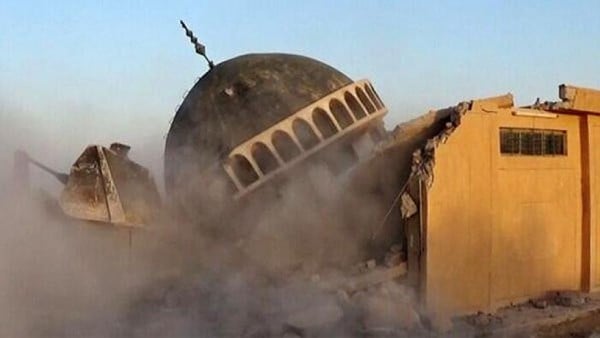Galleries
Antiquities Looted by ISIS on Sale in Central London Shops
ISIS reportedly also makes sales via Skype, Whatsapp, and Ebay.
ISIS reportedly also makes sales via Skype, Whatsapp, and Ebay.
Amah-Rose Abrams

Antiquities looted by ISIS have been found to be openly on sale in antique shops in central London.
While on an undercover assignment for the Guardian, Mark Altaweel, a Near East specialist from the UCL Institute of Archaeology, discovered looted items from Iraq and Syria on sale at antique shops in the capital.
While some of these were being represented as being from Jordan or India, Altaweel could immediately spot that was not the case.

A photo posted by ISIS that shows the destruction of what appears to be a Sufi shrine.
Photo: via Hyperallergic.
The extremist group often destroys historical sites and artifacts, and even broadcasts their activities online. But what they don’t destroy, they loot, scouring for valuable antiquities to sell so that they can bankroll their terror campaigns.
In fact, looted antiquities are now thought to be the second largest revenue stream for the so-called Islamic State.
“When Daesh (a derogatory Islamic name for ISIS) comes in, they take the looting and institutionalize it,” said Syrian archeologist Amr al-Azm, from Shawnee State University, to the Guardian. “So it becomes part of their admin, their revenue-raising enterprise—it becomes more intensified, escalated and organized.”
ISIS members reportedly make the sales using Skype, Kik, Ebay, and other online outlets. Bloomberg News recently exposed the attempted sale of a Mesopotamian vase, worth $250,000, conducted over Whatsapp.
Once these objects leave the Near East, the items that can establish some kind of false provenance can end up on auction in London and New York, fetching high prices.
When questioned, the dealers concerned often mentioned someone coming in with items from a family collection, a tactic often used to fake or confuse provenance.
The problem is so widespread that UNESCO is now using satellites to observe looting, locating many excavation sites by this method. UNESCO experts have also collaborated with ICOM to issue “red lists” of artifacts from Iraq and Syria.
Irina Bokova, UNESCO Director-General, addressed a meeting of experts only last week stating that around 2,000 of Iraq’s 10,000 world-renowned sites have been heavily looted.